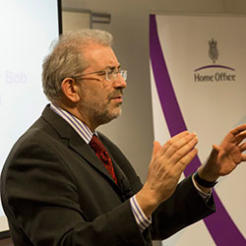The head of the civil service Sir Bob Kerslake met with charities last week to encourage a greater number of diversity of nominations from the voluntary and charitable sectors, particularly for volunteers.
Sir Bob, who is chair of the main honours committee hosted the event at 10 Downing Street. with Dame Clare Tickell, chair of the community, voluntary and local services honours committee for representatives of national voluntary bodies. Over 30 national voluntary bodies attend.
Sir Bob told civilsociety.co.uk: “What we have is an honours system that is very well regarded and people who get honours feel very proud. Communities are very supportive of it. But we have some issue about representation. There is not enough outside London and the south-east. There are also not enough nominations from the BME community. And there is still a lot to do in terms of women and honours. The purpose of the afternoon was how we can get more nominations where we are underrepresented.”
Sir Bob said that on the last honours list around 47 per cent were women but there was not that good a representation at all levels of honours. Only 6 per cent were from a BME background.
“This is too low,” he said. “The real test of the system is the quality and numbers of nominations we get.”
Most honours for services to the community
Sir Bob said that three-quarters of honours were rewarded to people for services to the community, but said it didn’t seem that high to the public as announcements on honours typically focused on big profile people in the media, arts and business.
“We need to try and raise awareness of this,” said Sir Bob.
Last year, the public administration committee said that the honours system rewarded too many people for doing their day job and more people undertaking voluntary work in their communities should be honoured.
Responding to concerns that some awards to people for voluntary work was an excuse to give honours to the “usual suspects”, Sir Bob said: “The way we can ensure that people have genuinely added something is through getting more nominations. We also have an independent committee that is made of people with knowledge of the voluntary and community sector. We can avoid the usual suspects by getting the widest range of nominations.”
Sir Bob said that the main honours committee will continue to work with community organisations to find out how it can strengthen nominations.
It is hoped that the invited organisations with their national reach can help to spread the message amongst their members and followers that anyone can nominate anyone for an honour and should be encouraged to do so.









